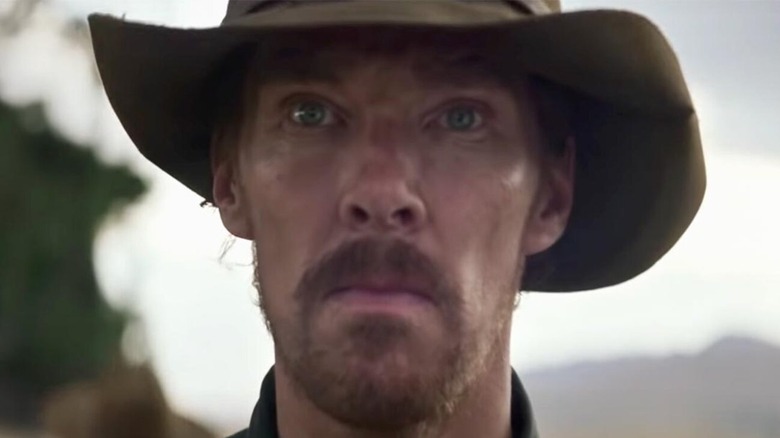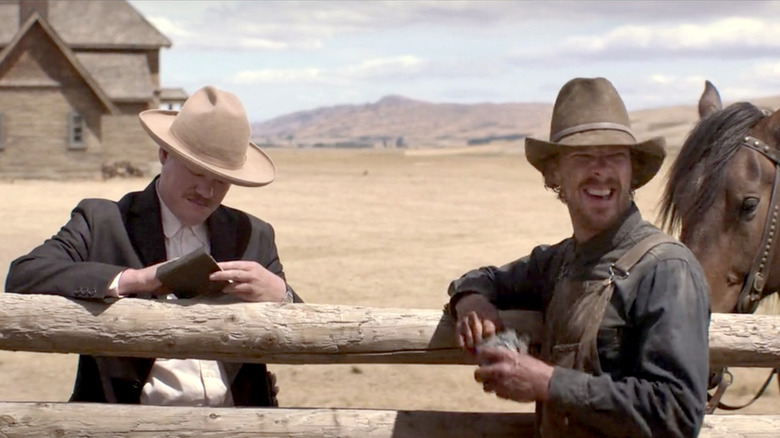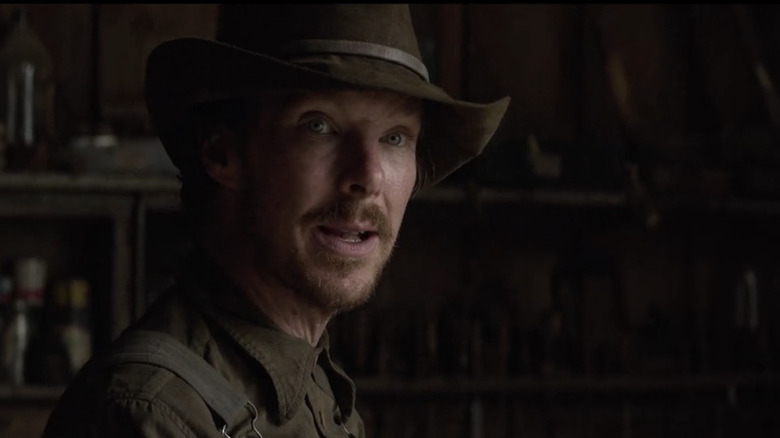The Power Of The Dog Scene That Went Too Far
Directed by Jane Campion, "The Power of the Dog" landed on Netflix in plenty of time for awards season, and the cowboy drama is already getting a lot of buzz from viewers on social media who have praised Benedict Cumberbatch and Campion for their work on the film. Cumberbatch plays a character outside his norm, bringing the abusive ranchhand Phil Burbank to life in the screen adaptation of Thomas Savage's novel of the same name.
The story follows two brothers — Phil and George Burbank (Jesse Plemons) — after George meets and falls in love with a widow named Rose, played by Kirsten Dunst. Both Rose and her teenage son, Peter (Kodi Smit-McPhee), become targets of Phil's abusive behavior before and after she marries George and moves to the ranch the brothers share. After driving Rose to alcoholism, Phil eventually begins to develop a friendly relationship with Peter after the youngster realizes he is a gay man who was in a romantic and sexual relationship with his late mentor, Bronco Henry.
Throughout the movie, Phil is hardly a likable character, saying terrible things to those around him. In an early scene, he calls his brother "fatso" and "a chubby no-nothing too dumb to get through college." He mocks Peter for his lisp and effeminate qualities, nicknaming him "Nancy" and eventually advising Peter not to let his mother turn him into "a sissy." When George announces he's marrying Rose, Phil refers to Rose and Peter as a "suicide widow and her half-cooked son" and takes his anger out on a horse, which he hits repeatedly and calls a "little b*tch" and "wh*re."
Out of all the despicable scenes involving Phil, there seems to be one that some viewers think goes too far.
The Power of the Dog illustrates Phil's savage character
Toxic masculinity and how it corrupts those affected by it is one of the biggest themes of "The Power of the Dog." Although he's a closeted gay man, Phil seems obsessed with proving his rugged masculinity and holds himself to the standards set by his implied lover and mentor, Bronco Henry. Throughout the movie, Phil shares stories of BH that indicate the other man was a tough and rugged cowboy stereotype.
Not long after the film announces Act IV to viewers, Phil's brutal character, personality, and toxic masculinity is illustrated in a graphic, hard-to-watch scene on the ranch that has even drawn the ire of People for the Ethical Treatment of Animals (PETA), according to their Twitter account. The scene shows Phil direct cowhands to detain a struggling bull, which he then savagely castrates using only a knife and his bare hands. He also places the used knife between his teeth as the scene appears to show Phill forcefully ripping the testicles from the bull's body in a close-up shot. Afterward, one of Phil's workers asks, "How come you don't wear gloves?" to which Phil responds, "How 'bout cause they're not needed." As hard as it is for many to watch, the single scene reinforces Phil's apathetic character and his belief in what true masculinity should be.
Many believe the scene goes too far
While Phil's abusive behavior toward Rose and Peter is infuriating, the graphic scene depicting the bull's castration seems to take the character's behavior to another level. PETA's social media statement includes a clip of the scene and reads, "#BenedictCumberbatch was quoted saying 'I did everything you see in the film' — he apparently learned to castrate bulls." Another Twitter user noted, "who would have thought the most horrific scene of the year would go to Benedict Cumberbatch castrating a bull in The Power of the Dog." A third user wrote, "If you think Doctor Strange making everyone forget about Spider-Man is crazy, wait till you see what Benedict Cumberbatch does to a bull with his bare hands in The Power of the Dog."
While the scene would have been easier to watch if it had been shown from a distance, Jane Campion's decision to highlight the castration in closeup gave it more impact for viewers. It helped cement their opinion of Phil as a non-caring, arrogant representative of toxic masculinity. While one could argue he was doing his job as a ranchhand, there are more humane ways to perform castration, even in the time in which the film is set.
In the end credits of "The Power of the Dog," there is no standard disclaimer that animals were monitored and unharmed during production. "The Power of the Dog" was shot entirely in New Zealand, where "The Hobbit" trilogy was also filmed. The Peter Jackson movies also came under fire for the death of 27 animals during production (per HuffPost).


